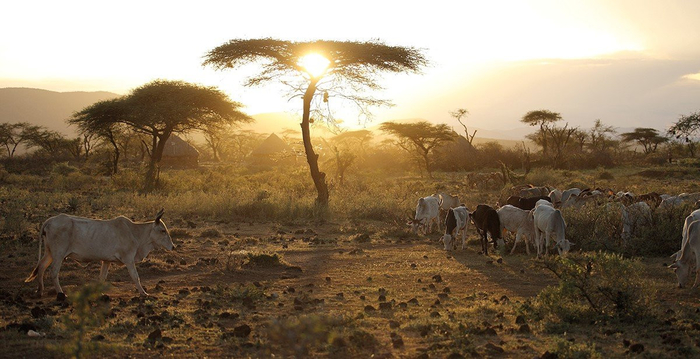Scientists have announced discovery of a new set of detailed genetic markers and information in African cattle that are associated with valuable traits, such as heat and drought tolerance, the capacity to control inflammation and tick infestations, and resistance to devastating livestock diseases like trypanosomiasis.
The findings, published in the October issue of Nature Genetics, emerged from a collaborative effort to sequence the genomes of 172 indigenous cattle by scientists at the Addis Ababa- and Nairobi-based International Livestock Research Institute (ILRI), Seoul National University (Republic of Korea), Rural Development Agency (RDA, Republic of Korea), University of Khartoum (Sudan), The Centre of Tropical Livestock Genetics and Health (CTLGH, Scotland), Swedish University of Agricultural Sciences (Sweden), and the University of Nottingham (United Kingdom). They wanted to learn how — after spending thousands of years confined to a shifting patchwork of sub-regions in Africa — cattle rapidly evolved during the last millennia with traits that allowed them to thrive across the continent.
“We believe these insights can be used to breed a new generation of African cattle that have some of the qualities of European and American livestock — which produce more milk and meat per animal—but with the rich mosaic of traits that make African cattle more resilient and sustainable,” said Olivier Hanotte, Principal Scientist at ILRI, Professor of Genetics at the University of Nottingham and Program Leader at CTLGH, who led the work at ILRI.
Hanotte and his colleagues engaged in a sort of “genomic time travel” that, for the first time, allowed scientists to retrace the genetic journey that has made African cattle so adaptable. They discovered what co-author Steve Kemp, Head of ILRI’s LiveGene program and Deputy Director of CTLGH described as an “evolutionary jolt” that occurred 750 to 1050 years ago: the arrival of Asian cattle breeds in East Africa carrying genetic traits that would make cattle production possible in diverse and demanding African environments.
The genome sequencing work yielded evidence that Indigenous pastoralist herders began breeding the Asian cattle, known as Zebu, with local breeds of cattle known as Taurine. In particular, the Zebu offered traits that would allow cattle to survive in hot, dry climates typical in the Horn of Africa. But by crossing the two, the new animals that emerged also retained the capacity of the Taurines to endure humid climates where vector-borne diseases like trypanosomiasis are common.
“Livestock — especially cattle — can be controversial, but without them, millions of people in Africa would have been forced to hunt wildlife for protein,” said co-author Ally Okeyo Mwai, a principal scientist at ILRI who leads its African Dairy Genetic Gains program. “That would have been devastating for the African environment and its incredible diversity of wildlife.”
It is now important to use the full range of natural genetic endowments that have made African cattle so resilient to sustainably meet Africa’s surging demand for milk and meat, while minimizing negative impacts of increased livestock production. For many households in Africa, and especially the poorest, livestock in general and cattle, in particular, continue to be a family’s most valuable asset. They provide a critical source of protein and micronutrients alongside income to pay for things like school fees. They also provide manure for crops, and some African cattle breeds can survive in conditions that can’t support food crops, offering farmers a potential adaptation strategy for coping with climate change.
“We’re fortunate that pastoralists are such skilled breeders,” Hanotte said. “They left a valuable roadmap for efforts underway at ILRI and elsewhere to balance livestock productivity in Africa with resilience and sustainability.”
“You can see from studying the genomes of indigenous cattle that breeding for environmental adaptation has been the key to successful livestock production in Africa,” said Kemp. “And that has to be the factored in our future efforts to develop more productive, more sustainable animals. If the goal is pure productivity, you’re doomed to fail.”
“It’s important to understand that livestock breeding has long played a vital role in sustaining the health and wealth of African communities,” said ILRI Director General Jimmy Smith. “The focus on breeding for resilience that guided past efforts provides a touchstone for future work to chart a sustainable path for livestock production in sub-Saharan Africa.”


